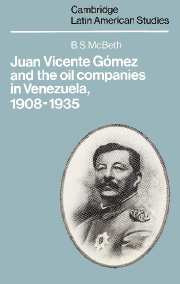Book contents
- Frontmatter
- Contents
- List of tables and map
- Preface
- List of abbreviations
- Introduction
- 1 The dawning of an era
- 2 The legal framework
- 3 Oil companies and finance
- 4 National and local effects of the oil industry
- 5 Greater control of the oil industry
- Conclusion
- Appendix
- Notes
- Bibliography
- Index
- CAMBRIDGE LATIN AMERICAN STUDIES
4 - National and local effects of the oil industry
Published online by Cambridge University Press: 22 September 2009
- Frontmatter
- Contents
- List of tables and map
- Preface
- List of abbreviations
- Introduction
- 1 The dawning of an era
- 2 The legal framework
- 3 Oil companies and finance
- 4 National and local effects of the oil industry
- 5 Greater control of the oil industry
- Conclusion
- Appendix
- Notes
- Bibliography
- Index
- CAMBRIDGE LATIN AMERICAN STUDIES
Summary
The direct impact of the oil industry was felt first in Zulia State, and only later in the rest of the country. Zulia's socio-economic structure was severely disrupted by the oil boom because it created a scarcity of labour for the traditional agricultural sector, and because it had a tremendous inflationary effect on the local economy. The oil boom, however, stimulated the expansion of the commercial elite of the country which during the 1920s and 1930s strengthened its position within the economy to the detriment of the agricultural elite. Although the period was one in which agriculture was in decline, it should be noted that up to 1936 it contributed substantially to the country's economic growth: for example, according to Rangel, Táchira State's agricultural production and exports (coffee and cattle) continued to rise during the 1920s. Nevertheless, the disparity between the oil and agricultural sectors widened during this period.
Venezuela's total trade during Gómez's regime increased enormously: for example, between 1908 and 1929 exports increased from Bs.83 million to Bs.739 million, a 790 per cent increase due mainly to the oil boom of the 1920s. Oil exports during the mid-1920s displaced traditional exports of coffee and cocoa. The traditional markets for Venezuelan exports were the U.S., France, and Germany, while Britain was the largest single supplier of foreign goods. During the First World War, when European markets were closed and there was a lack of adequate transport facilities, the U.S. increased its trade with the whole of South America.
- Type
- Chapter
- Information
- Juan Vicente Gómez and the Oil Companies in Venezuela, 1908–1935 , pp. 109 - 158Publisher: Cambridge University PressPrint publication year: 1983



